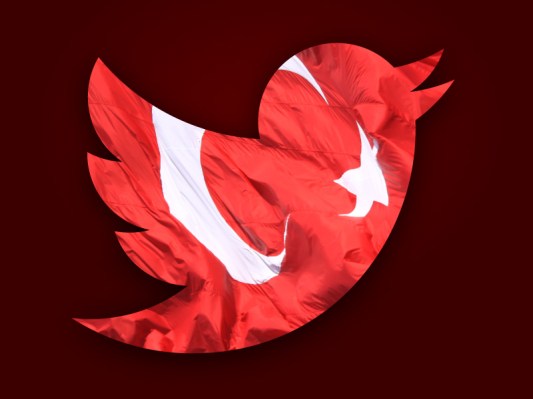Help appears to be at hand for advocates of free speech in Turkey, where Twitter access has been cut off after the Prime Minister accused it of helping people spread false information about him. Twitter has announced that it is standing by its users and working on restoring access soon.
Today, the site and its users in the country saw a huge wave of support from around the world, as people rallied around the social network to protest the blockade. The Prime Minister, Tayyip Erdoğan, said he wanted to “wipe out” Twitter and other sites that have been critical of him and a corruption scandal that has been brewing.
In Turkey, the blockade has had many loopholes for those who want to find them. People have been using SMS messages to post to the site — Twitter’s recommended route — while others have used a workaround by changing their DNS addresses, typically using Google’s DNS and OpenDNS — a route that has become a meme in itself.
Graffiti over symbols of the state and sides of building indicating DNS routes that Turks could use to get around the clumsy ban quickly went viral:
The ban on Twitter usage, weak and porous as it was, was implemented gradually. Its lifting will also likely take place in pieces. That means when and if Twitter comes back online it may not be for everyone. “I constantly talk to my friends & family. It’s still blocked and everyone is using openDNS to access Twitter,” Turkish expat Halil Kabaca, CEO and Founder at Novarum Software & Consulting, told us by email.
We’ve heard that there may also be a protest planned over the Internet blocks.
With Twitter inaccessible for many, we’ve heard people are going to Eksisozluk.com, another popular social site, to communicate more. But the fact that Twitter has such a high international profile, and has been such a touchpoint around other political conflicts has very much amplified this story.
“It is a pretty big deal over here. Everybody is talking about it (ironically, on twitter),” Berna Yildiz, a foreign trade manager for BEM Berk, told us in an email today after we noticed she was Tweeting from Turkey (using a DNS workaround, it turns out). “There was a time they have banned YouTube and it stayed that way for a looong period. But even then, the president said ‘you can find a way, I use YouTube.’ [But] Erdoğan is using Twitter to create a diversion. Nothing else. There have been new regulations to spy on and restrict internet usage a month ago. Because of the tapes released about his corruption.”
Turkey is unfortunately not a stranger to blocking shenanigans. “Turkey is one of our largest traffic sources in Europe,” David Ulevitch, the founder and CEO of OpenDNS, tells us. “This isn’t the first time they’ve blocked sites.” He notes that sites like WordPress in the past have also been blocked. “Using OpenDNS and our dnscrypt client that encrypts DNS is advised.”
If you need to change your DNS settings to get around the ban, or any future ban, or to speed up your access if it happens to feel slow, head here if you are a using a Mac, and here if you are on a PC. Those instructions will help you use either Google’s Public DNS, or OpenDNS. If one doesn’t work for you, try the other.
Twitter has about 10 million users in Turkey, and this blockade has had the exact opposite effect on awareness of the country’s political situation and those who are opposed to it, even if usage has definitely dropped in the country itself.
According to Sysomos, there have been 8.5 million tweets in total in Turkey from 12 AM ET March 19 – 10 AM ET March 21, compared to only 1.2 million tweets in Turkey from 12 AM ET March 21 – 10 AM ET March 21.
Around 1 million of those tweets can be attributed to the fact that the Twitter website is blocked, but users can still send tweets via SMS, Sysomos said.
However, in the last 7 days, worldwide tweets that mentioned both “Turkey” and “Twitter” went from a steady 200 per day to 80,000+ per day on March 20 and March 21. In other words, the effect of the ban has backfired. Instead of silencing dissent, it has given it new voice, and momentum.
Image: composite with photo by Flickr user Jeremy Vandel under a CC by 2.0 license
